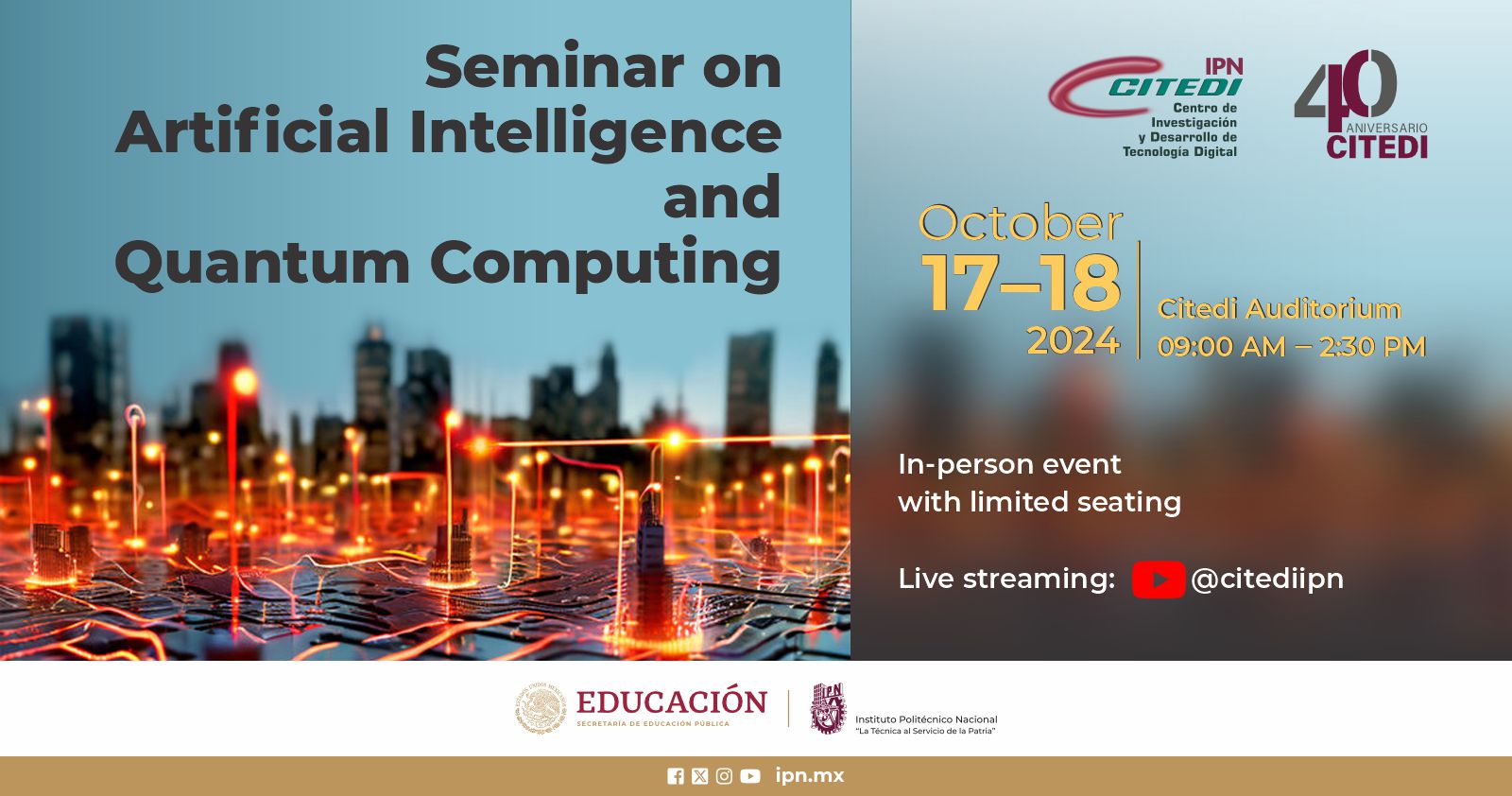

On October 17 - 18, 2024, in face-to-face mode at the Auditorium of the Center for Research and Development of Digital Technology (IPN-CITEDI), Tijuana, Baja California, Mexico.
In this space you will find the program of the conferences related to the different fields of Artificial Intelligence and Quantum Computing.
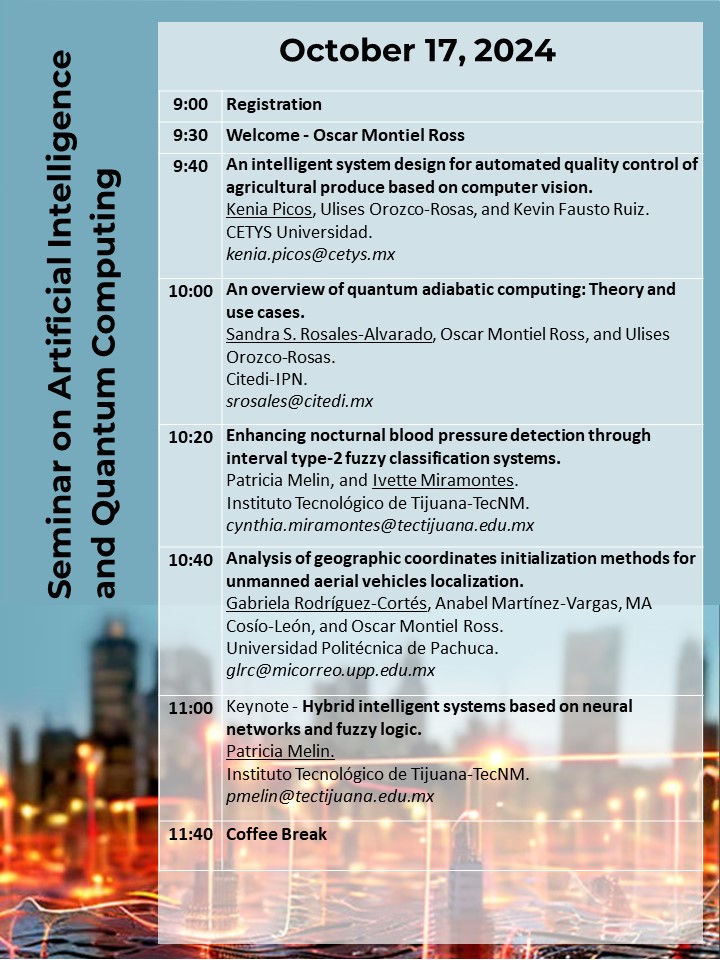
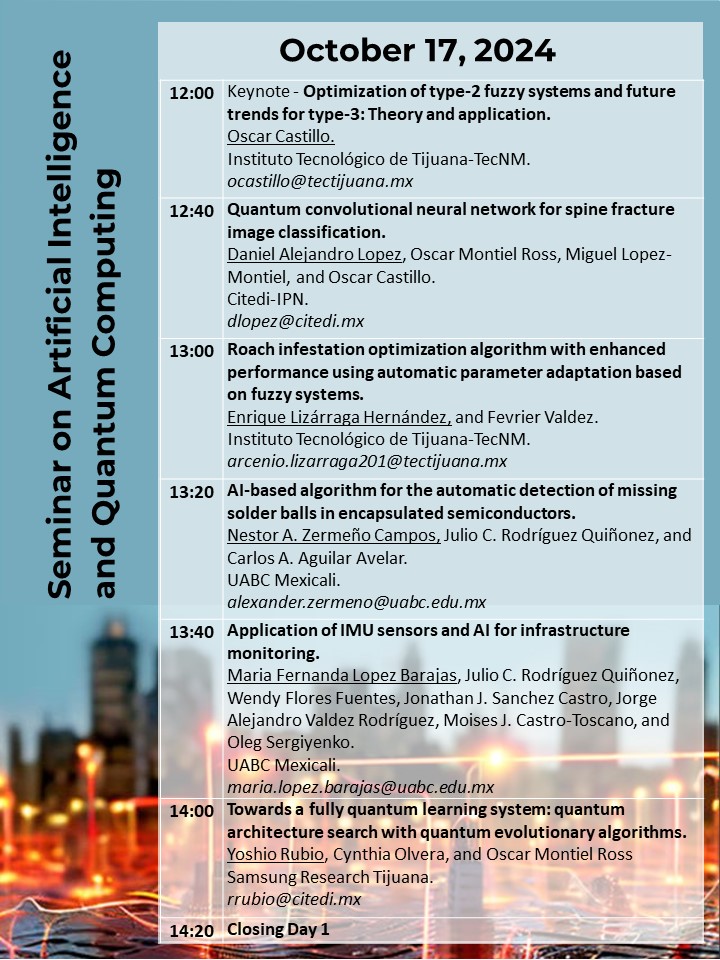
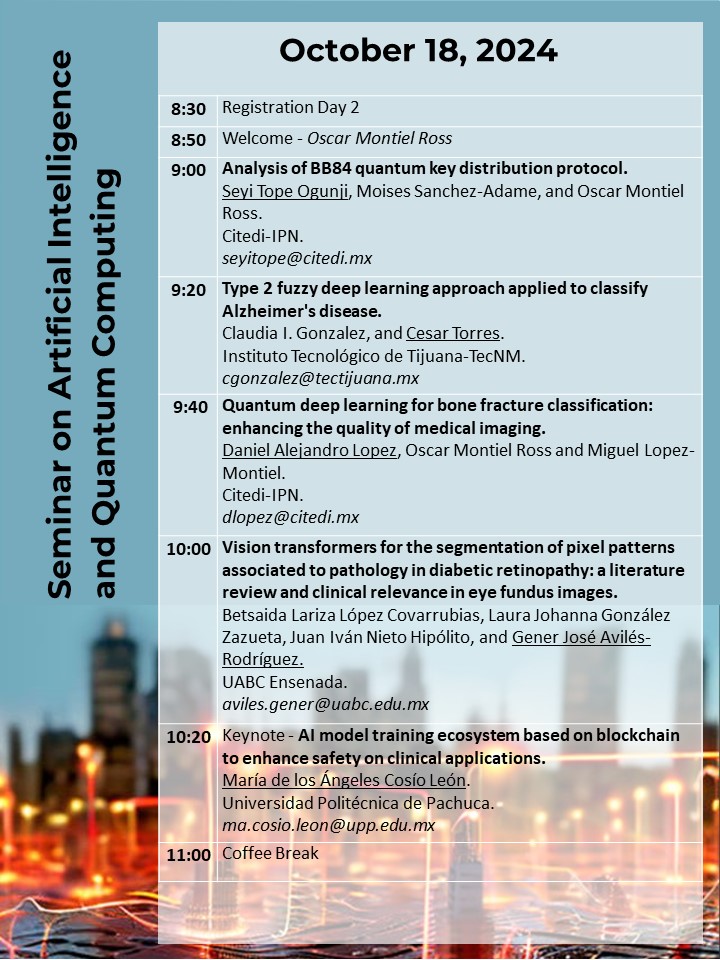
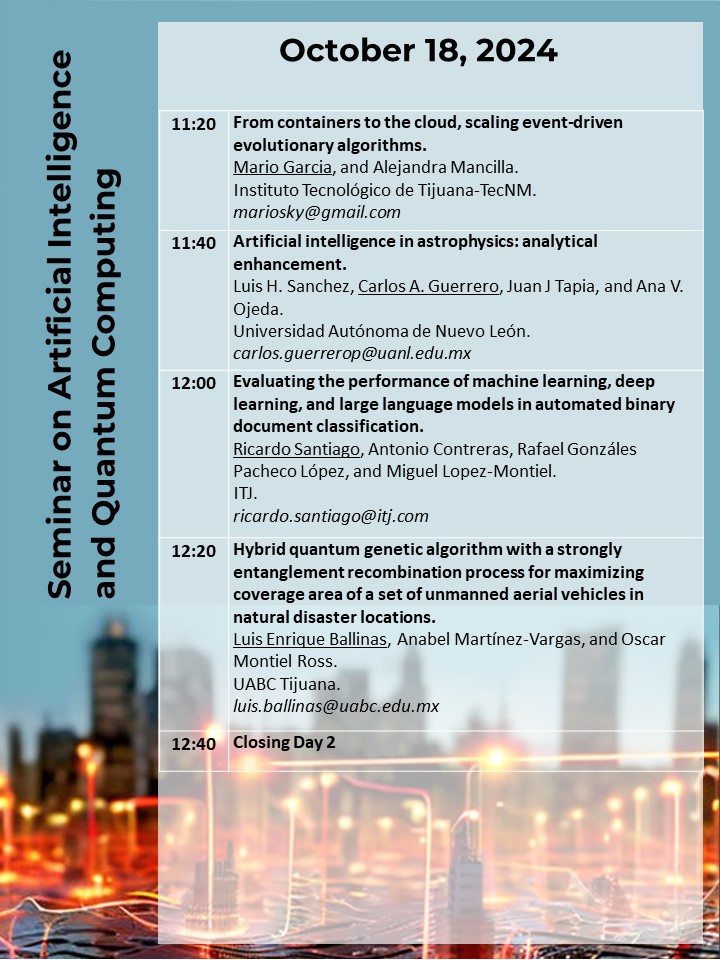
Patricia Melin — Keynote
Hybrid Intelligent Systems based on Neural Networks and Fuzzy Logic.
October 17, 2024 • 11:00 AM
Patricia Melin is a Professor of Computer Science in the Graduate Division, Tijuana Institute of Technology-TecNM, Tijuana, Mexico, since 1998. In addition, she is serving as Director of Graduate Studies in Computer Science and is head of the research group on Hybrid Neural Intelligent Systems (2000-present). She belongs to the Mexican Research System with level III (SNI highest level). She holds the Doctor in Science degree (Doctor Habilitatus D.Sc.) in Computer Science from the Polish Academy of Sciences. She has also been advisor of more than 100 graduate students in computer science at the Ph.D. and masters levels. Prof. Melin has published nearly 1100 publications in indexed journals, book chapters, and conference proceedings, as well as nearly 50 books, and as consequence of this she has achieved more than 23700 citations with an h index of 86 in Google Scholar, and h index of 76 in Scopus. In addition, she has been awarded the Highly Cited Researcher recognition in the area of Computer Science in 2017 and 2018 by Clarivate Analytics-Web of Science because she is in the top 1% cited author in this area. She has also been awarded with the IFSA 2021 Award on Outstanding Applications of Fuzzy Technology for the contribution of Development and Application of Fuzzy Models in Medical Diagnosis, the NAFIPS 2022 K. S. Fu Award for contributions to the North American Fuzzy Information Processing Society, the INFUS 2022 and 2024 Lotfi A. Zadeh Memorial Award for the outstanding contribution to fuzzy sets and systems field. She is past President of NAFIPS (North American Fuzzy Information Processing Society) 2019-2020. Prof. Melin is the founding Chair of the Mexican Chapter of the IEEE Computational Intelligence Society. She is member of the IEEE Neural Network Technical Committee (2007 to present), the IEEE Fuzzy System Technical Committee (2014 to present) and is the founding Chair of the Task Force on Hybrid Intelligent Systems (2007 to present) and she is currently Associate Editor of the Information Sciences Journal, IEEE Transactions on Fuzzy Systems and Journal of Complex and Intelligent Systems. She is Editor-in-Chief of the Advances in Fuzzy Systems journal (Wiley). She is member of NAFIPS, IFSA, and IEEE. Her research interests are in Modular Neural Networks, Type-2 Fuzzy Logic, Pattern Recognition, Fuzzy Control, Neuro-Fuzzy and Genetic-Fuzzy hybrid approaches.
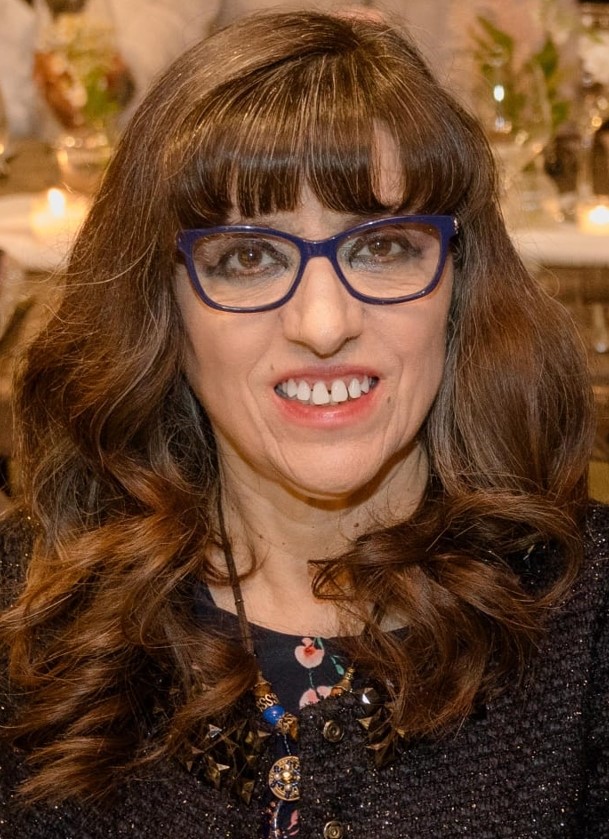
Oscar Castillo — Keynote
Optimization of Type-2 Fuzzy Systems and Future Trends for Type-3: Theory and Application
October 17, 2024 • 12:00 PM
Oscar Castillo holds the Doctor in Science degree (Doctor Habilitatus) in Computer Science from the Polish Academy of Sciences (with the Dissertation “Soft Computing and Fractal Theory for Intelligent and Manufacturing”). He is a Professor of Computer Science in the Graduate Division, Tijuana Institute of Technology, Tijuana, Mexico. In addition, he is serving as Research Director of Computer Science and head of the research group on Hybrid Fuzzy Intelligent Systems. Currently, he is President of HAFSA (Hispanic American Fuzzy Systems Association) and Past President of IFSA (International Fuzzy Systems Association). Prof. Castillo is also Chair of the Mexican Chapter of the Computational Intelligence Society (IEEE).
He is also a member of NAFIPS, IFSA and IEEE. He belongs to the Mexican Research System (SNI Level 3). His research interests are in Type-2 Fuzzy Logic, Fuzzy Control, Neuro-Fuzzy and Genetic-Fuzzy hybrid approaches. He has published over 300 journal papers, 20 authored books, 100 edited books, 300 papers in conference proceedings, and more than 300 chapters in edited books, in total more than 1180 publications (according to Scopus) with h index of 97 and more than 31000 citations according to Google Scholar. He has been Guest Editor of several successful Special Issues in the past, like in the following journals: Applied Soft Computing, Intelligent Systems, Information Sciences, Soft Computing, Non-Linear Studies, Fuzzy Sets and Systems, JAMRIS and Engineering Letters.
He is currently Associate Editor of the Information Sciences Journal, Journal of Engineering Applications on Artificial Intelligence, International Journal of Fuzzy Systems, Journal of Complex Intelligent Systems, Granular Computing Journal and Intelligent Systems Journal (Wiley). He was Associate Editor of Journal of Applied Soft Computing and IEEE Transactions on Fuzzy Systems. He has been elected IFSA Fellow in 2015 and MICAI Fellow in 2016. Finally, he recently received the Recognition as Highly Cited Researcher in 2017 and 2018 by Clarivate Analytics and Web of Science.
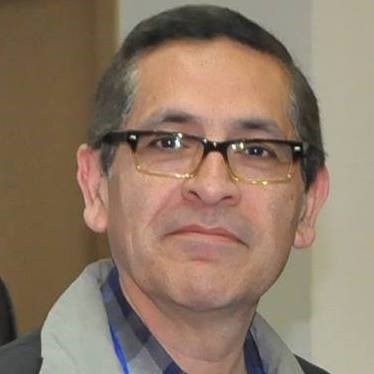
María de los Ángeles Cosío León — Keynote
AI model training ecosystem based on blockchain to enhance safety on clinical applications.
October 18, 2024 • 11:00 AM
María de los Ángeles Cosío León. Doctor in Science from the Autonomous University of Baja California (UABC campus Ensenada), currently a member of the National System of Researchers (SNI), Level I, by CONAHCYT. She holds a certification in Artificial Intelligence from HUAWEI and has completed a Diploma in Applied Artificial Intelligence at the Potosino Institute of Scientific and Technological Research (IPICyT) as well as a course at the HUAWEI International Training Center in Hangzhou, China, focused on large language models (LLMs).
Since 2018, she has served as a research professor at the Universidad Politécnica de Pachuca.
Her research focuses on the study and design of algorithms for data preparation and analysis, as well as data ecosystem traceability. Additionally, she works on optimization techniques based on statistical methods and reinforcement learning, applied to the quantification of components in crude oil.
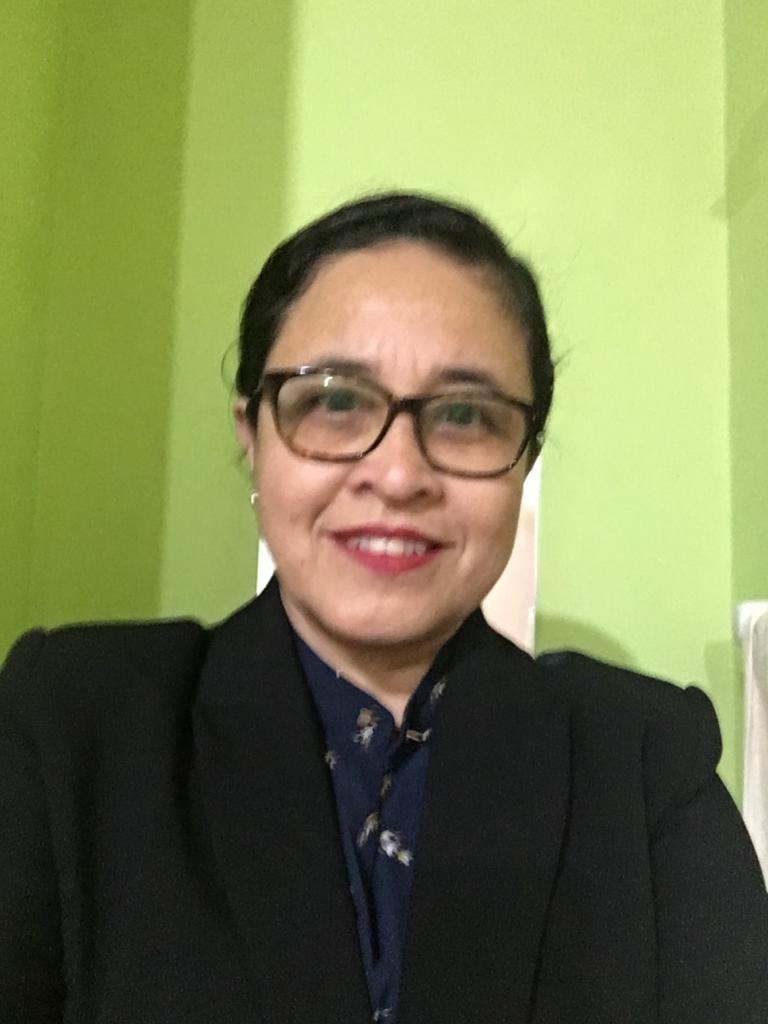
Kenia Picos
An intelligent system design for automated quality control of agricultural produce based on computer vision.
October 17, 2024 • 9:40 AM
Kenia Picos is a full-time professor at CETYS Universidad at Escuela de Ingeniería Campus Tijuana. She received her PhD degree in 2017 from Instituto Politécnico Nacional at Centro de Investigación y Desarrollo de Tecnología Digital. She concluded a postdoctoral research in 3D pose estimation with artificial intelligence in Madrid Spain in 2018. Her current research interests include computer vision, object recognition, three-dimensional object tracking, pose estimation, and parallel computing with graphics processing units.
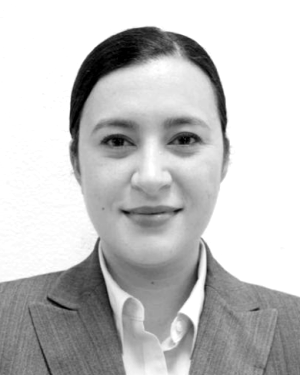
Sandra S. Rosales-Alvarado
Comparative performance analysis of the QAOA, and Quantum Adiabatic Optimization Algorithms.
October 17, 2024 • 10:00 AM
Sandra S. Rosales holds a Master’s degree in Computer Science from the Universidad Autónoma de Querétaro and a Bachelor's degree in Computing from the Universidad Autónoma Metropolitana, campus Iztapalapa (UAM-I). Currently, she is pursuing a Ph.D. in Centro de Investigación y Desarrollo de Tecnología Digital del I.P.N. (CITEDI-IPN). Her research focuses on developing algorithms that optimize the use of both classical and quantum hardware resources. She analyzes various algorithmic designs aimed at solving specific problems, executes these algorithms, evaluates their performance, and subsequently develops improved versions. Her ultimate goal is to create a quantum algorithm that fully leverages the unique capabilities of quantum technology.
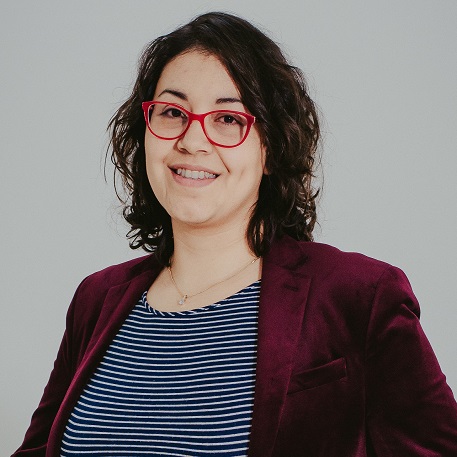
Ivette Miramontes
Enhancing Nocturnal Blood Pressure Detection through Interval Type-2 Fuzzy Classification Systems.
October 17, 2024 • 10:20 AM
Ivette Miramontes has 15 years of solid experience in software development and 9 years in research, focusing on significant soft computing projects aimed at addressing national issues, such as the early detection of hypertension.
All these contributions have materialized in the writing of numerous articles published in prominent indexed journals, as well as in the co-authorship of a book. Additionally, she has earned recognition as a Level 1 National Researcher in the National System of Researchers (SNII).
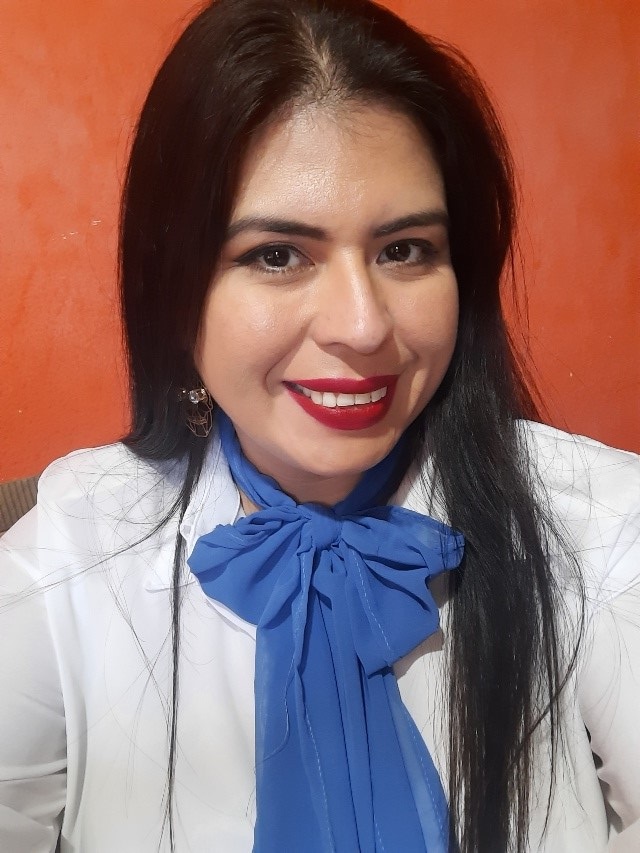
Gabriela Rodríguez-Cortés
Analysis of Geographic Coordinates Initialization Methods for Unmanned Aerial Vehicles Localization.
October 17, 2024 • 10:40 AM
Gabriela Lizeth Rodríguez Cortes completed her studies in Electronic Engineering and Telecommunications at the Universidad Autónoma del Estado de Hidalgo and earned a Master's degree in Information and Communication Technologies from the Universidad Politécnica de Pachuca. She is currently a PhD candidate working on a dissertation in Advanced Sciences and Technologies at the Universidad Politécnica de Pachuca. Her research interests include bio-inspired algorithms, optimization, and temporal communication networks based on UAVs.
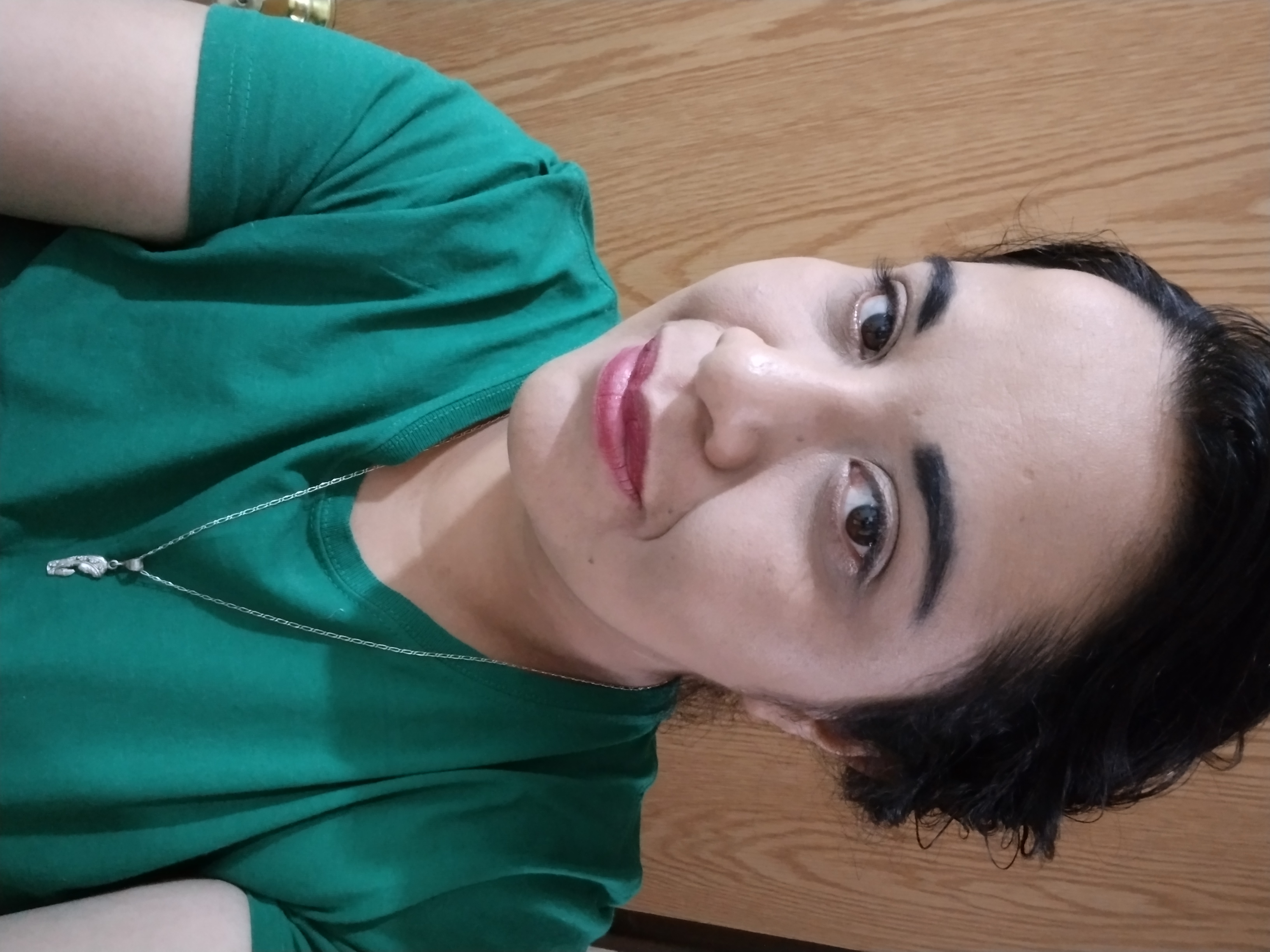
Daniel Alejandro Lopez
Quantum Convolutional Neural Network for Spine Fracture Image Classification.
October 17, 2024 • 12:40 PM
Quantum Deep Learning for Bone Fracture Classification: Enhancing the Quality of Medical Imaging.
October 18, 2024 • 10:20 AM
Daniel Alejandro Lopez Montiel I graduated with honors in Biomedical Engineering from the Tecnológico Nacional de México - Instituto Tecnológico de Tijuana (ITT - TecNM) in 2021. In 2022, I pursued a Master's degree in Digital Systems at the Centro de Investigación y Desarrollo de Tecnología Digital - Instituto Politécnico Nacional (CITEDI - IPN), where I graduated with honors in August 2024. My thesis centered on developing hybrid classical-quantum methods for computer-aided diagnosis of spine fractures in medical images. Currently, I am continuing my research as a PhD student in Digital Systems at CITEDI - IPN, with a focus on machine learning, deep learning, high-performance computing, quantum computing, and quantum machine learning, particularly applied to medical image diagnosis.

Enrique Lizárraga Hernández
Roach infestation optimization algorithm with enhanced performance using automatic parameter adaptation based on fuzzy systems.
October 17, 2024 • 13:00 PM
Enrique Lizárraga is a PhD student supported by CONACYT. His main interests include bio-inspired computing, evolutionary computing, fuzzy logic, swarm intelligence, neural networks, and intelligent control. He currently has two published book chapters, entitled "Fuzzy Dynamic Parameter Adaptation in the Mayfly Algorithm: Implementation of Fuzzy Adaptation and Tests on Benchmark Functions" and "Neural Networks and Fuzzy Dynamic Parameter Adaptation in the Mayfly Algorithm: Preliminary Tests for a Parameter Variation Study." Also, he has participated with presentations in two international conferences: International Seminar on Intelligent Computing (ISCI) 2019 and International conference on Intelligent and Fuzzy Systems (INFUS) 2024.
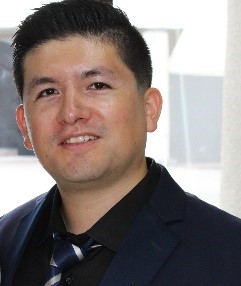
Nestor A. Zermeño Campos
AI-based algorithm for the automatic detection of missing solder balls in encapsulated semiconductors.
October 17, 2024 • 13:20 PM
Nestor Alexander Zermeño Campos is a PhD student at the Faculty of Engineering of the Autonomous University of Baja California (UABC). He obtained his M.S. degree in Computer Science in 2021 and his B.S. degree in Bioengineering in 2015 at the same institution. He currently works as a Data Scientist and Development Leader within the semiconductor industry and has 8 years of experience in data analysis and development of automation and data-driven decision-making tools for various industries.
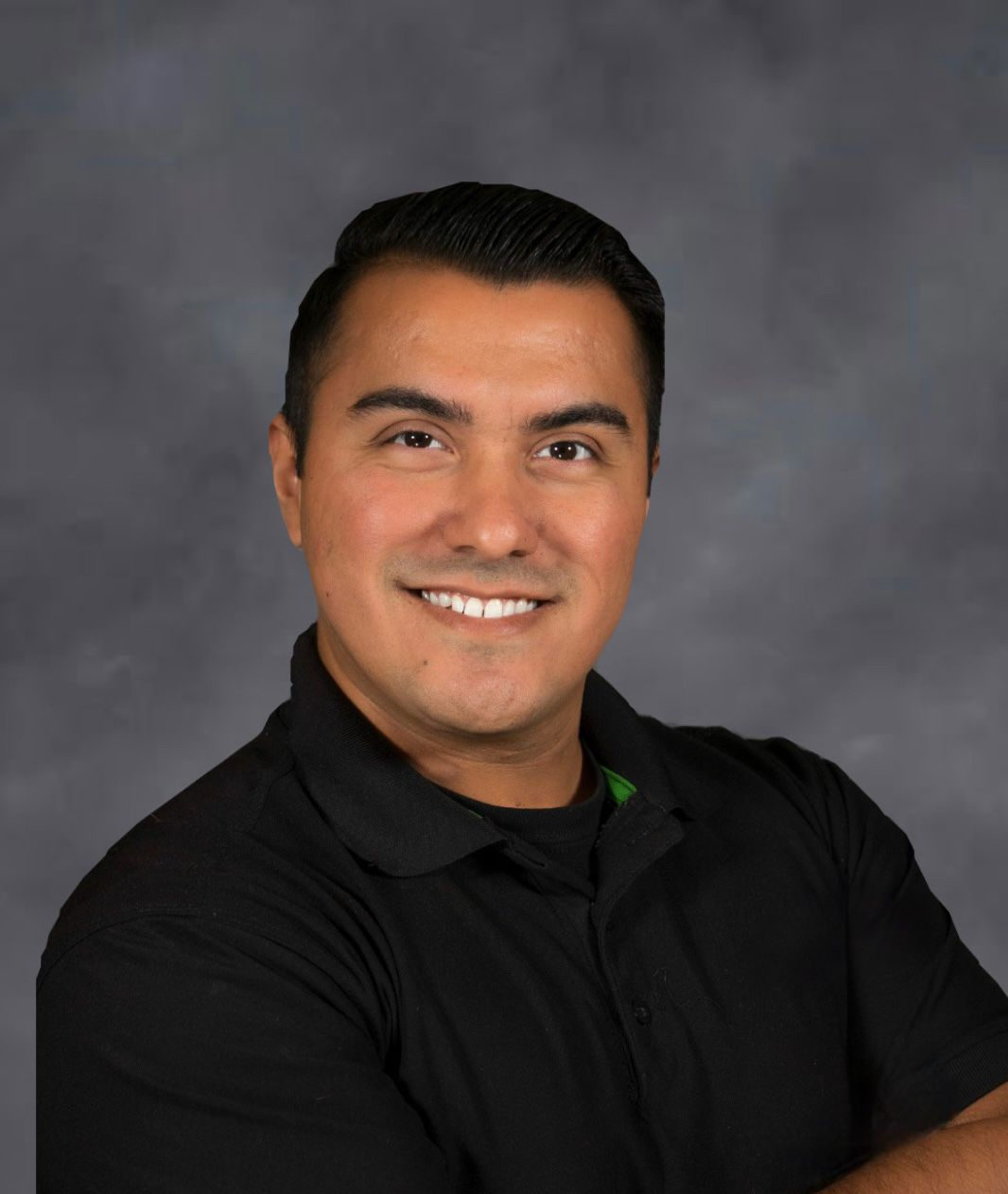
Maria Fernanda Lopez Barajas
Application of IMU sensors and AI for Infrastructure Monitoring.
October 17, 2024 • 13:40 PM
Maria Fernanda López-Barajas was born on July 8th, 1998, in Mexicali, Baja California, Mexico. She earned her degree in Mechatronic Engineering from the Universidad Politécnica de Baja California (UPBC) in 2020. Since 2023, she has pursued a master's degree at the Faculty of Engineering at the Universidad Autónoma de Baja California (UABC). She focuses on IMU sensors and artificial intelligence research, particularly neural networks, to classify data obtained from an IMU. She has been a lecturer since 2022, teaching in the Mechatronic Engineering program at both UPBC and UABC.
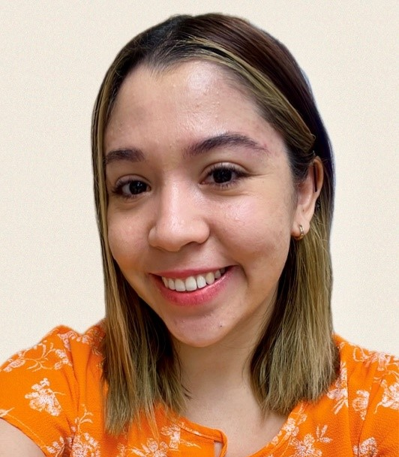
Cynthia Olvera
Towards a fully quantum learning system: quantum architecture search with quantum evolutionary algorithms.
October 17, 2024 • 14:00 PM
Cynthia Olvera holds a DSc in Digital Systems from the National Polytechnic Institute, through the Center for Research and Development of Digital Technology (CITEDI-IPN), where she conducted research on classifying EEG signals using quantum intelligent computing. Her contributions include several publications on quantum and quantum-inspired evolutionary algorithms and their applications in numerical optimization and machine learning, emphasizing the potential of hybrid classical-quantum systems. Currently, Cynthia works at Corteza.AI, where she contributes to researching, designing, and deploying cutting-edge machine learning and deep learning models to tackle complex real-world challenges.
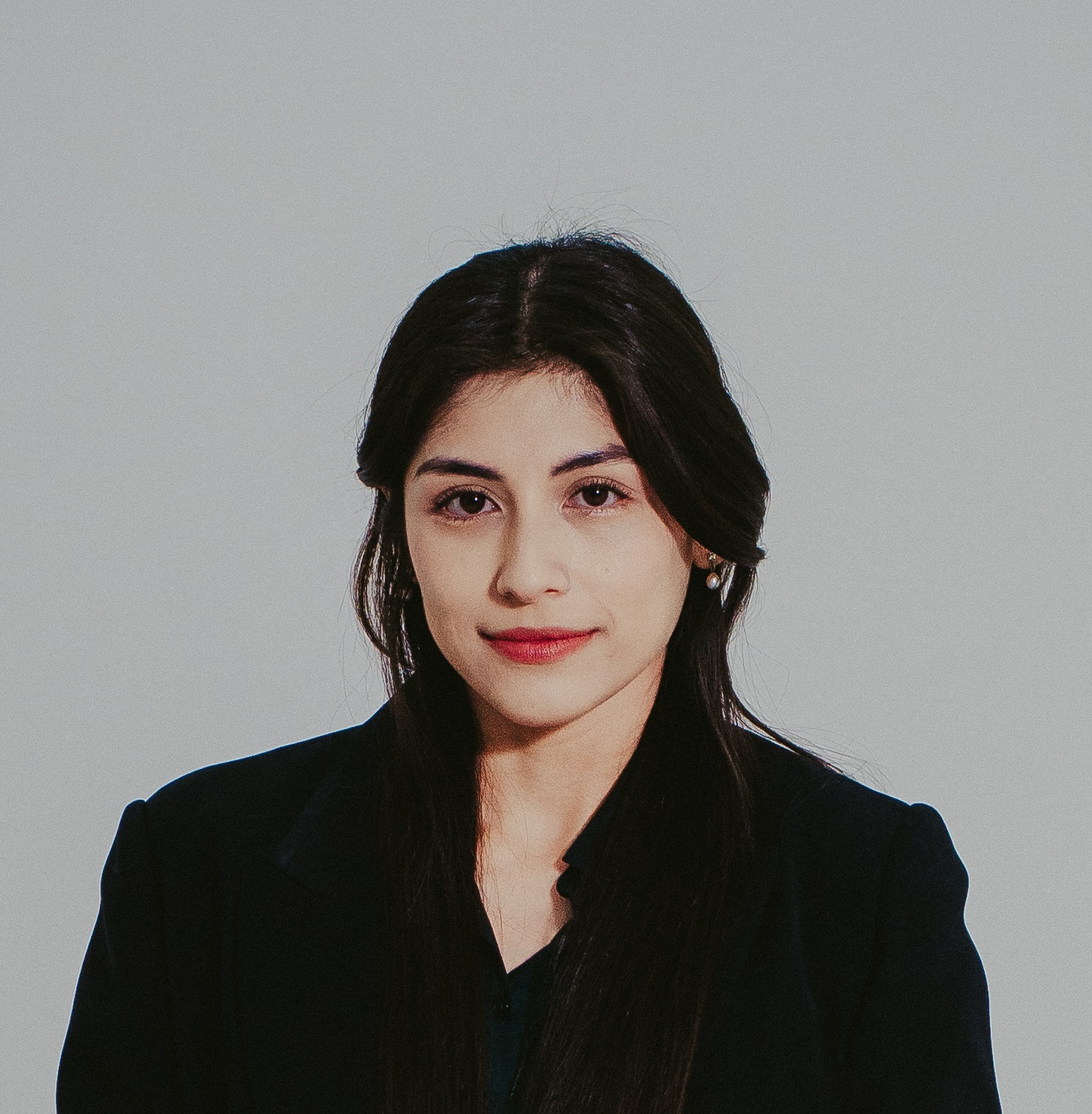
Seyi Tope Ogunji
Analysis of BB84 Quantum Key Distribution Protocol.
October 18, 2024 • 9:40 AM
Seyi Tope Ogunji is a graduate of Electrical/Electronics Engineering and a researcher in the emerging technology domain. Graduating with honors from Ogun State Institute of Technology in Nigeria, Seyi earned multiple awards for academic excellence, including state-level recognition. His passion for emerging technology led him to the Coding School in the United States, where he earned a certification in quantum computing. Currently pursuing a Master's degree at Instituto Politécnico Nacional's CITEDI Centre in Mexico, Seyi's research focuses on integrating AI with cybersecurity to enhance digital safety. With a background spanning from industrial automation and maintenance at Procter & Gamble, people management at Hayat, to founding an AI education non-profit, Seyi brings a special combination of practical, corporate world experience and academic expertise.
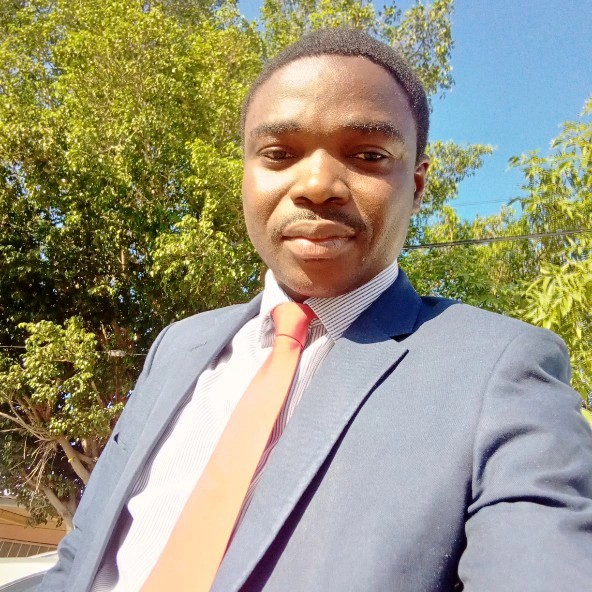
Cesar Torres
Type 2 fuzzy deep learning approach applied to classify Alzheimer's disease.
October 18, 2024 • 10:00 AM
Cesar Alan Torres Quiroz is a PhD candidate at the Division of Graduate Studies at TECNM/Tijuana Institute of Technology, he obtained a master’s degree in computer science from the same institution. He is a graduate of Computer Science Engineering from CETYS University. Author of multiple scientific publications, in which you can find at articles in indexed journals, book chapters and proceedings of international conferences. He has been collaborating at Samsung Research Tijuana as a Machine Learning Engineer, working on state-of-the-art Artificial Intelligent technologies tailored to edge devices. His areas of expertise include Computer Vision, Generative AI (Large Language Models, Large Visual Models, Diffusion Models, Generative Adversarial Networks), Fuzzy Logic, Edge Computing, Multimodal Learning and Self-Hosted Services. My current doctoral research focuses on utilizing Generative AI technologies to address challenges related to neurodegenerative diseases.
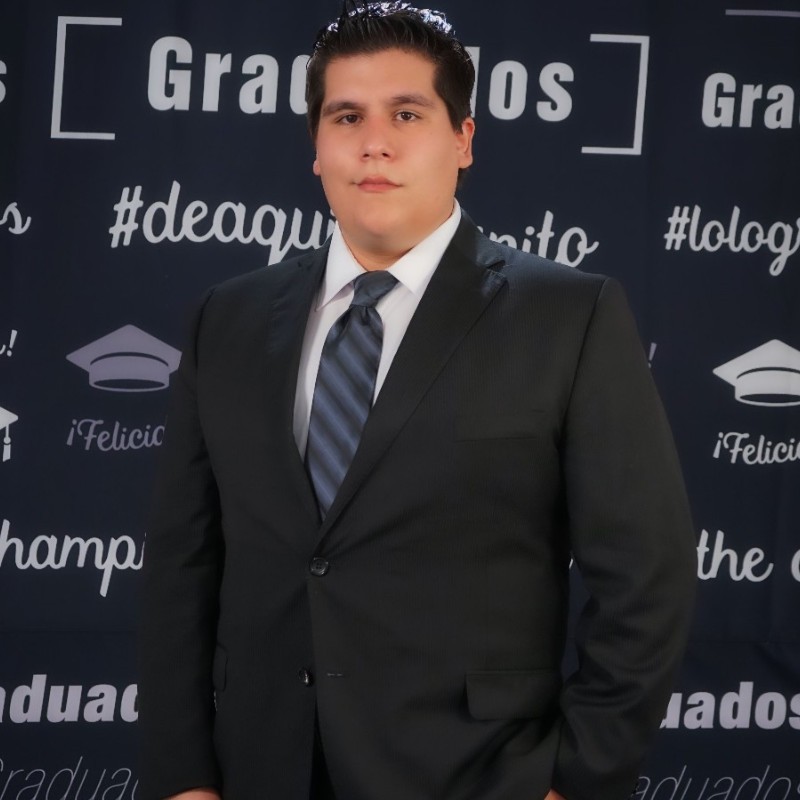
Gener José Avilés-Rodríguez
Vision Transformers for the Segmentation of Pixel Patterns Associated to Pathology in Diabetic Retinopathy: A Literature Review and Clinical Relevance in Eye Fundus Images.
October 18, 2024 • 10:40 AM
Gener Avilés initially trained and practiced as a Medical Doctor before advancing his education with a Master’s degree and a Doctorate in Science, focusing on data analytics and machine learning applications for processing medical data at the Universidad Autónoma de Baja California (UABC). He is currently a Researcher-Professor at the School of Health Sciences, UABC, where his research is centered on the field of computational medicine. His work involves developing computational models to enhance the understanding and simulation of scenarios within the Health-Illness continuum, both for individual patients and broader populations. Dr. Avilés is also a member of Mexico’s National System of Researchers (Level C) and the National Young Academy of Mexico (Academia Jóven de México).
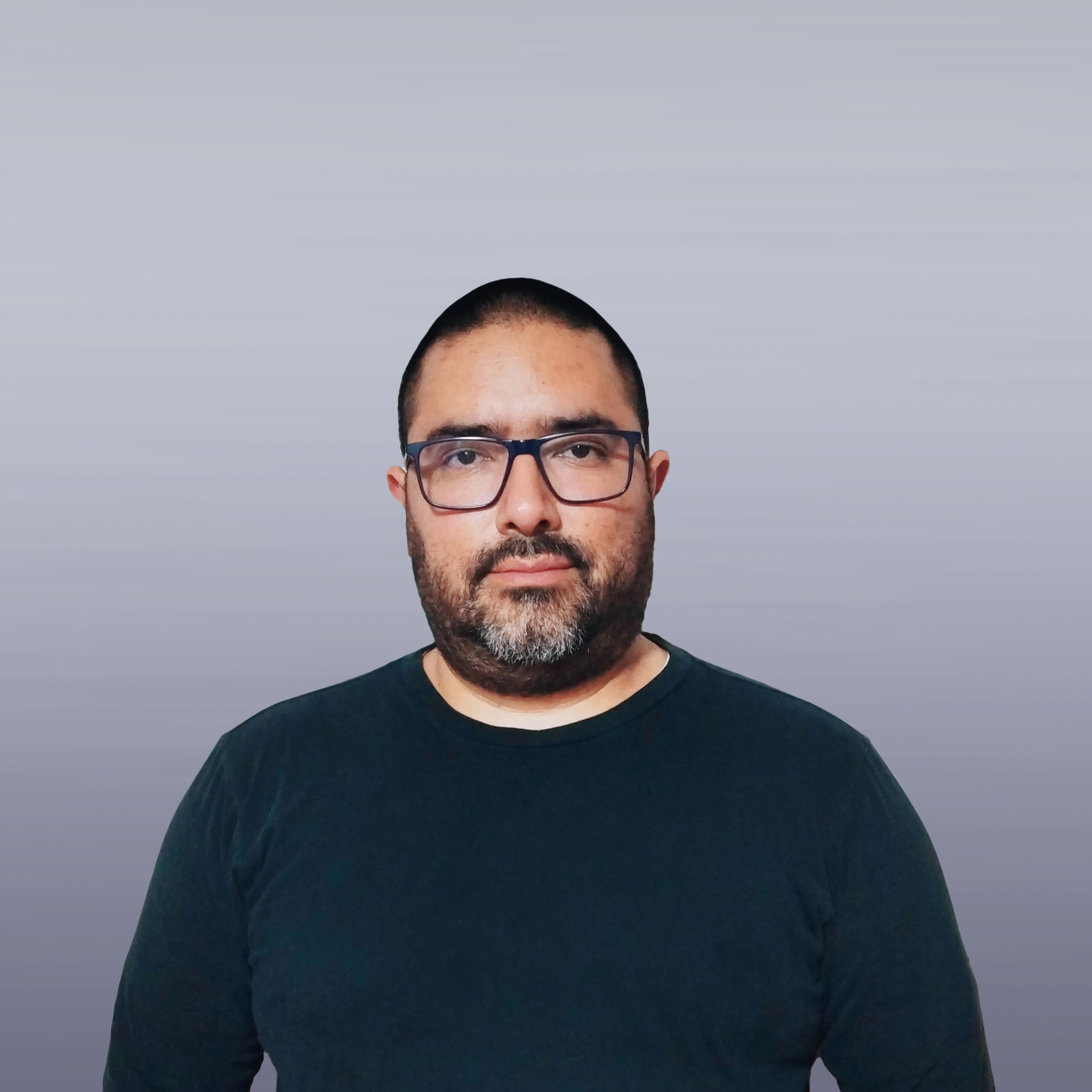
Mario Garcia
From containers to the cloud, scaling event-driven evolutionary algorithms.
October 18, 2024 • 12:00 PM
Mario García-Valdez is a full-time Research Professor with the Tijuana Institute of Technology. His research interests include interactive systems, voluntary computing, parallel evolutionary computation, and interactive evolutionary computation.
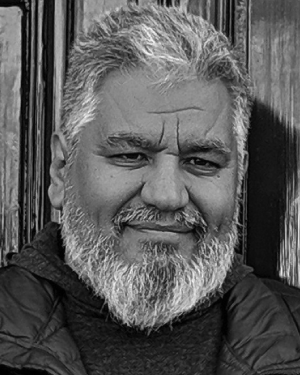
Carlos A. Guerrero
Artificial Intelligence in Astrophysics: Analytical Enhancement.
October 18, 2024 • 12:20 PM
Carlos Alberto Guerrero Peña Graduated with a Bachelor's degree in Physics from the Faculty of Sciences at UNAM, he completed his Master's and Ph.D. studies in Sciences with a specialization in Astronomy and Astrophysics at the Institute of Astronomy at UNAM. Following this, he undertook four postdoctoral stays at the National Observatory of Río de Janeiro, from the Ministry of Science, Technology, and Innovation in Brazil. In 2017 he became an Associate Researcher at the Institute of Astronomy at UNAM, where he also served as a Resident Astronomer at the National Astronomical Observatory. In 2023 Dr. Guerrero joined the Faculty of Physical-Mathematical Sciences at Universidad Autónoma de Nuevo León, as a Full Time Professor and Researcher. His research focuses on high-spatial resolution and high-cadence observational studies applied to stellar astrophysics, multi-technique analysis of star formation and evolution in homogeneous samples of celestial bodies in the Milky Way, planetary sciences, astronomical instrumentation and big data and machine learning techniques coupled to astrophysics. Some of the projects in which he is active include: J-PLUS: Javalambre-Photometric Local Universe Survey from the National Astronomy and Astrophysics Program of the Ministry of Economy and Competitiveness of Spain; POEMS: Physics of Extreme Massive Stars, European Commission, Horizon 2020 Program; Development and integration of a two-dimensional Fourier transform spectrograph for the Guillermo Haro Astrophysical Observatory, from the INAOE through project: “Support program for the Strengthening and Development of Scientific and Technological Infrastructure 2016”; High-performance computing and optimization strategies for data science applications in astrophysics, in collaboration with Dr. Juan José Tapia from CITEDI-IPN; Deciphering the relationships between surface properties, rotation, fragmentation, and taxonomy for Near-Earth Objects using telescopes at OAN-SPM and the new telescope at OA-UANL, from CONAHCYT project: “Science without Borders program”, amongst others. Dr. Guerrero has been recognized with an SNII-Level 2 distinction.
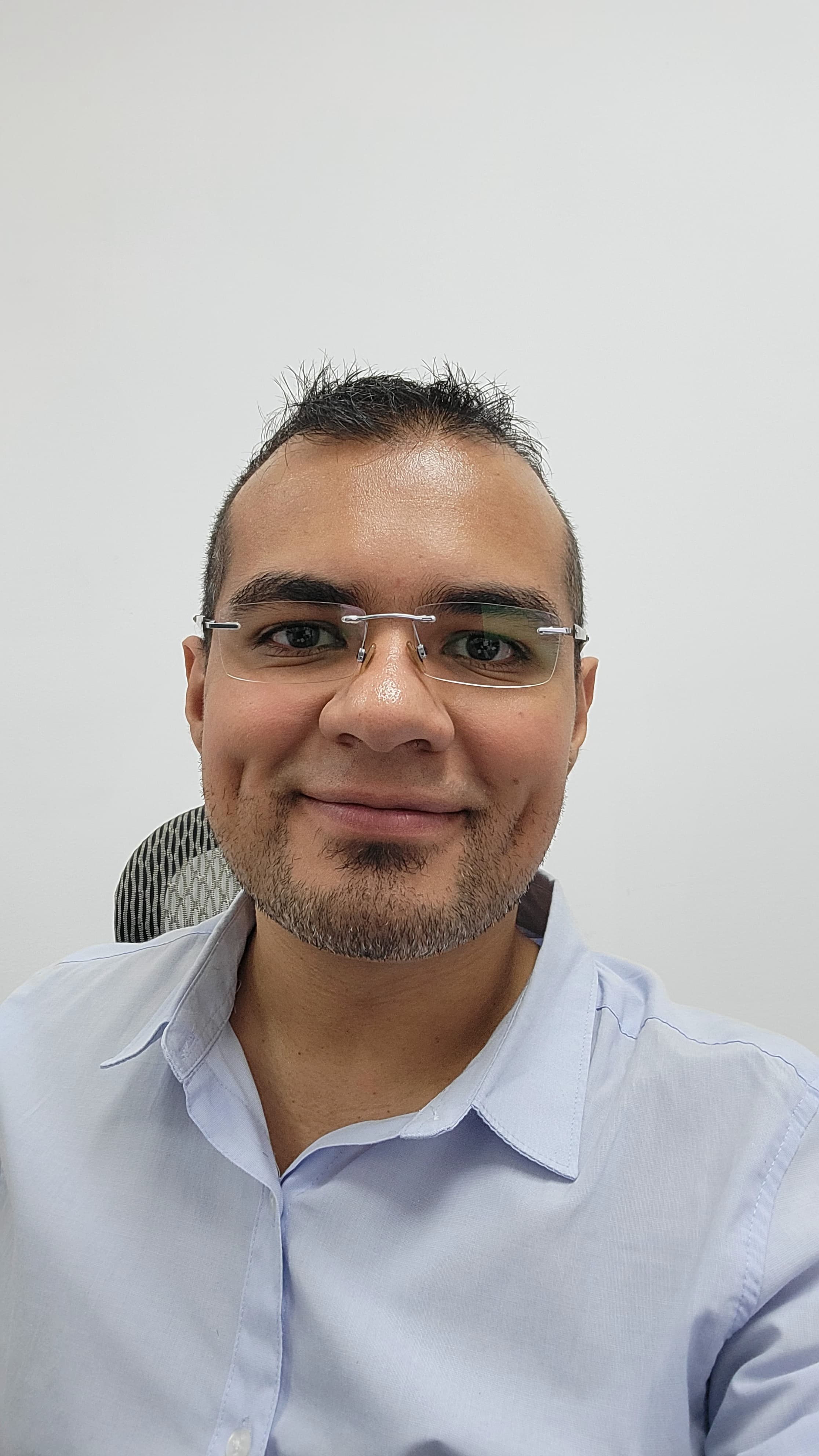
Ricardo Santiago
Evaluating the Performance of Machine Learning, Deep Learning, and Large Language Models in Automated Binary Document Classification.
October 18, 2024 • 12:40 PM
Ricardo Rioda Santiago Sanchez graduated with a degree in Computer Systems Engineering from the Tijuana Institute of Technology, and has participated in the 2019 National Physics Olympiad (ONF). He is currently working in the data science area at ITJ Labs. He is passionate about mathematics, physics and the area of machine learning.
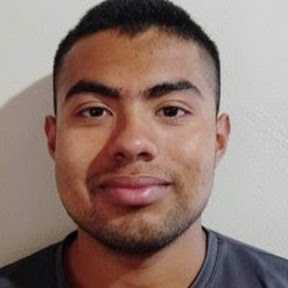
Luis Enrique Ballinas
Hybrid Quantum Genetic Algorithm with a strongly entanglement recombination process for maximizing coverage area of a set of unmanned aerial vehicles in natural disaster locations.
October 18, 2024 • 13:00 PM
Enrique Ballinas Electronics Engineer from the Instituto Tecnológico de Tuxtla Gutiérrez, Chiapas, Mexico (2015); Master of Science in Digital Systems from the Centro de Investigación y Desarrollo de Tecnológica Digital (CITEDI) of the Instituto Politécnico Nacional, Tijuana, Baja California, Mexico (2018); and Doctor of Science in Digital Systems from the Centro de Investigación y Desarrollo de Tecnológica Digital (CITEDI) of the Instituto Politécnico Nacional, Tijuana, Baja California, Mexico (2022). He has participated in competitions related to the area of autonomous vehicles and actively participates in the development of quantum evolutionary algorithms for solving combinatorial optimization problems. He is currently a professor at the Universidad Autónoma de Baja California (UABC) and the Centro de Enseñanza Técnica y Superior (CETYS University). His areas of interest are: Evolutionary algorithms, quantum computing, quantum evolutionary algorithms, fuzzy systems.

Dr. Oscar Montiel Ross, CITEDI-IPN.
Dra. Anabel Martínez Vargas, Universidad Politécnica de Pachuca.
Dr. Ulises Orozco Rosas, CETYS Universidad.
Dr. Oscar Castillo Lopez, Instituto Tecnológico de Tijuana.
Dra. Patricia Melin Olmeda, Instituto Tecnológico de Tijuana
“Dr. Oscar Castillo and Dr. Patricia Melin have been instrumental in the formation and development of our research group in the field of intelligent computing, serving as cornerstones for our progress and achievements.”
October 17, 2024
Oscar H. Montiel Ross, CITEDI-IPN.
Moises Sanchez, CITEDI-IPN.
Daniel Alejandro Lopez Montiel, CITEDI-IPN.
Seyi Tope Ogunji, CITEDI-IPN.
October 18, 2024
Ulises Orozco Rosas, CETYS Universidad.
Anabel Martínez Vargas, Universidad Politécnica de Pachuca.
Fernando Alonso Morquecho Lara, CITEDI-IPN.
Daniel Alejandro Lopez Montiel, CITEDI-IPN.
For more information, please contact us through the emails provided in the program.